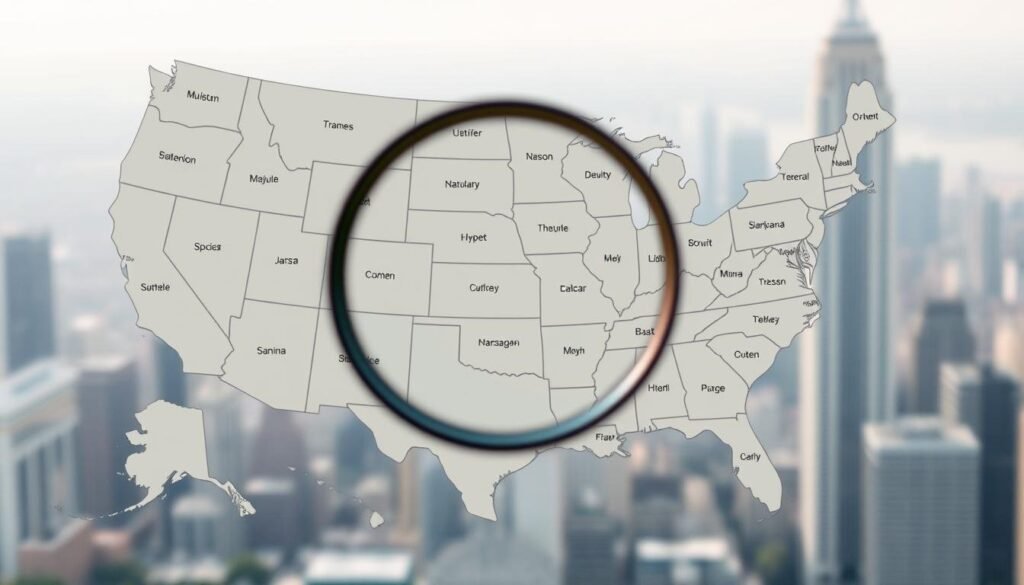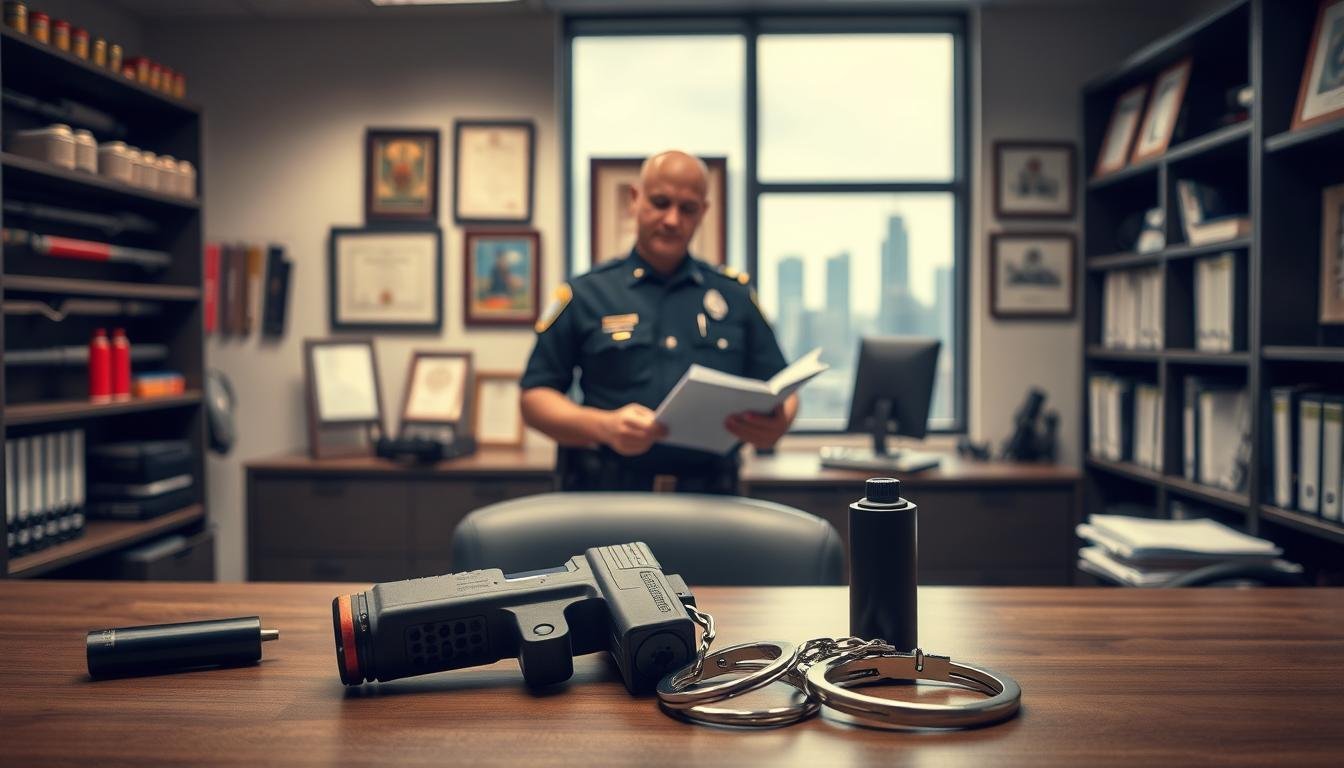Last updated on October 7th, 2025 at 07:18 am
Can Felons Own Non-Lethal Guns? It’s important for people with felony convictions to understand the laws about owning non-lethal guns. The rules on guns can be very complex. Each state has its own laws, making it hard to keep up.
You should know your rights and the laws in your state. Non-lethal guns, like stun guns or pepper guns, have different rules than regular guns. Some states let felons have these guns, but others don’t.
Knowing the laws about non-lethal guns in your state is key. This way, you can make smart choices about your rights and duties.
Contents
- 1 Understanding Non-Lethal Guns and Weapons
- 2 Federal Firearm Laws for Convicted Felons
- 3 Can a Felon Own a Non-Lethal Gun?
- 4 State-by-State Variations in Non-Lethal Weapon Laws
- 5 Legal Alternatives and Rights Restoration
- 6 Conclusion: Can Felons Own Non-Lethal Guns?
- 7 FAQ
- 7.1 Can a felon own a non-lethal gun in the United States?
- 7.2 What is considered a non-lethal gun?
- 7.3 Are non-lethal guns considered firearms under federal law?
- 7.4 Can a felon possess pepper spray for self-defense?
- 7.5 How can a felon regain their right to bear arms?
- 7.6 Are there any exceptions to federal firearm laws for convicted felons?
- 7.7 Can a felon own a non-lethal gun in states with strict gun control laws, such as California or New York?
- 7.8 What are the penalties for a felon found in possession of a non-lethal gun?
Understanding Non-Lethal Guns and Weapons
It’s important to know the difference between non-lethal and lethal guns. This is especially true for people with felony convictions. Non-lethal guns and weapons are made to stop or slow someone down without killing them. They are a good choice for those who can’t have lethal guns because of felon rights rules.
Non-lethal weapons include:
- Pepper spray and other chemical irritants
- Stun guns and Tasers
- Rubber bullets and bean bag rounds
- Other less-lethal projectiles
These tools help you defend yourself without the danger of deadly force. For example, pepper spray is easy to use and works well. Stun guns and Tasers shock an attacker to stop them.
The laws about non-lethal weapons vary. But usually, they are easier to get than lethal guns. It’s key to know the self-defense laws in your area. This helps you understand what’s legal for defending yourself.
In short, non-lethal guns and weapons are a good choice for self-defense. They are especially useful for those who can’t have lethal guns. Knowing about these weapons and their laws is important for keeping yourself safe.
Federal Firearm Laws for Convicted Felons
If you’ve been convicted of a felony, you need to know about federal firearm laws. These laws are strict, stopping felons from owning guns, even non-lethal ones.
Having a felony conviction means you can’t own guns anymore. The Gun Control Act (GCA) makes it clear. The Bureau of Alcohol, Tobacco, Firearms and Explosives (ATF) enforces this rule.
Breaking these laws can lead to big trouble. A felon caught with a gun could face up to 10 years in jail. They might also have to pay fines or both. [Can Felons Own Non-Lethal Guns?]
But, there are some exceptions. Some states let felons ask to get their gun rights back. Yet, federal law doesn’t automatically give them back. They must apply to the ATF for relief.
Exceptions and Relief
Even though federal law has few exceptions, some people might qualify for relief. Here’s a quick look at the main points:
| Law/Regulation | Description | Exceptions |
|---|---|---|
| Gun Control Act (GCA) | Prohibits felons from possessing firearms | Relief through ATF |
| Bureau of Alcohol, Tobacco, Firearms and Explosives (ATF) | Enforces federal firearm laws | Petition for restoration of rights |
| Federal Firearm Laws | Imposes penalties for felons in possession of firearms | Limited exceptions for certain individuals |
It’s key to understand these laws and any exceptions for felons. Talking to a lawyer can help you deal with the complex rules of federal firearm laws. [Can Felons Own Non-Lethal Guns?]
Can a Felon Own a Non-Lethal Gun?
To figure out if a felon can own a non-lethal gun, we need to know what the law says about firearms. The definition of a firearm is key to understanding the rights and limits for people with felony convictions.
The federal law says a firearm is “any weapon (including a starter gun) which will or is designed to or may readily be converted to expel a projectile by the action of an explosive.” But it also has rules for things that aren’t considered firearms, like old guns or devices for signaling or non-lethal uses.
Non-lethal guns, like stun guns or BB guns, might not be seen as firearms under the GCA if they don’t use explosives. But, the rules can differ in each place, and some states might include non-lethal devices in their laws.
Legal Implications for Felons
For a felon, knowing if a non-lethal gun is a firearm is very important. If it’s not seen as a firearm, federal law might not stop a felon from owning it. But, state laws can be stricter, and some might not let felons have certain non-lethal weapons.
Court interpretations have varied, with some courts saying certain non-lethal devices aren’t firearms. Others have said specific devices could be seen as firearms because of how they’re made or work.
In the case of United States v. Wallace, the court looked at if a stun gun was a firearm. This case shows how tricky it is to decide what’s a firearm and how important local laws are.
If a felon wants to own a non-lethal gun, they should look into the laws in their area. It’s a good idea to talk to a lawyer to understand the laws about owning firearms and non-lethal weapons.
State-by-State Variations in Non-Lethal Weapon Laws
Laws about non-lethal weapons differ a lot from state to state in the U.S. It’s key to know the legal rules for non-lethal guns in each place.
Federal laws set a basic rule for guns, but states have their own rules for non-lethal weapons. This means what’s okay in one state might not be in another.

In places like California, New York, and Massachusetts, the rules for non-lethal weapons are strict. For example, California has rules for pepper spray. It must be used only for self-defense and can’t have too much concentration. Knowing these details is important for using them legally.
Texas, Florida, and Arizona Regulations
But, states like Texas, Florida, and Arizona have looser rules. Texas lets you have some non-lethal guns without a license, but there are rules. Florida and Arizona also let you use pepper spray for self-defense, but with certain rules.
It’s important to know the laws in your state to follow them. Whether you’re a felon or just want to know your rights, understanding state gun laws is crucial. It helps you use non-lethal weapons safely and legally.
As laws change, it’s important to stay updated. Knowing the different state laws helps you protect yourself and your rights. [Can Felons Own Non-Lethal Guns?]
Legal Alternatives and Rights Restoration
Knowing your legal options for self-defense is key if you have a felony. As a felon, owning firearms might be off-limits. But, there are other ways to protect yourself.
Pepper spray and stun guns are legal alternatives for self-defense. They can stop an attacker without causing lasting harm. But, it’s important to know the laws about these tools, as they differ by state.
For example, some states have rules about using pepper spray and stun guns. Knowing these laws helps you avoid legal trouble. Here’s a look at some self-defense options:
| Self-Defense Option | Legality | Effectiveness |
|---|---|---|
| Pepper Spray | Varies by state | High |
| Stun Guns | Restricted in some states | High |
| Personal Alarms | Generally legal | Moderate |
Understanding your legal self-defense options is important. You might also want to know about rights restoration. This means getting back your right to bear arms, a process that can be complex.
Getting your rights back can give you more self-defense choices. But, it’s important to follow the legal steps carefully. You should talk to a lawyer to learn what you need to do in your state.
By knowing your legal options and the rights restoration process, you can make smart choices about protecting yourself. [Can Felons Own Non-Lethal Guns?]
Conclusion: Can Felons Own Non-Lethal Guns?
You now know more about the laws for felons and non-lethal guns. The rules on can a felon own a non lethal gun change a lot from state to state. It’s very important to learn about the laws in your area.
As a felon, owning a non-lethal gun can still lead to legal problems. Some states let felons have certain non-lethal guns, but others have strict rules. Breaking these rules can lead to serious penalties.
To stay out of trouble, you should learn about the laws in your state. Knowing these laws helps you understand your rights and duties as a felon.
Being aware of the laws about non-lethal guns helps you follow the law. This way, you can avoid legal issues. [Can Felons Own Non-Lethal Guns?]
See Also: Can a Cop Marry a Felon? Exploring the Legal Implications
FAQ
Can a felon own a non-lethal gun in the United States?
Laws about felons owning non-lethal guns differ by state. It’s key to know the laws in your area.
What is considered a non-lethal gun?
Non-lethal guns, like stun guns or BB guns, aim to stop or scare without killing. [Can Felons Own Non-Lethal Guns?]
Are non-lethal guns considered firearms under federal law?
Federal law might see non-lethal guns as firearms. This depends on the gun’s type and features.
Can a felon possess pepper spray for self-defense?
Laws on pepper spray for felons vary by state. But many places let felons carry it for self-defense. [Can Felons Own Non-Lethal Guns?]
How can a felon regain their right to bear arms?
Getting back the right to bear arms varies by state. It often involves a court petition or waiting period.
Are there any exceptions to federal firearm laws for convicted felons?
Some exceptions exist, like for antique firearms or if the felony was expunged or pardoned. [Can Felons Own Non-Lethal Guns?]
Can a felon own a non-lethal gun in states with strict gun control laws, such as California or New York?
In strict gun control states, laws on non-lethal guns might be tighter. Felons could face more rules. [Can Felons Own Non-Lethal Guns?]
What are the penalties for a felon found in possession of a non-lethal gun?
Penalties can include fines and jail time. They depend on the situation and state laws. [Can Felons Own Non-Lethal Guns?]

Van Maldonado, born in California, holds a degree in Criminology and Police Science. Currently serving as an investigative officer at a local police station, he spends his leisure time writing insightful content for FelonScope.com.

